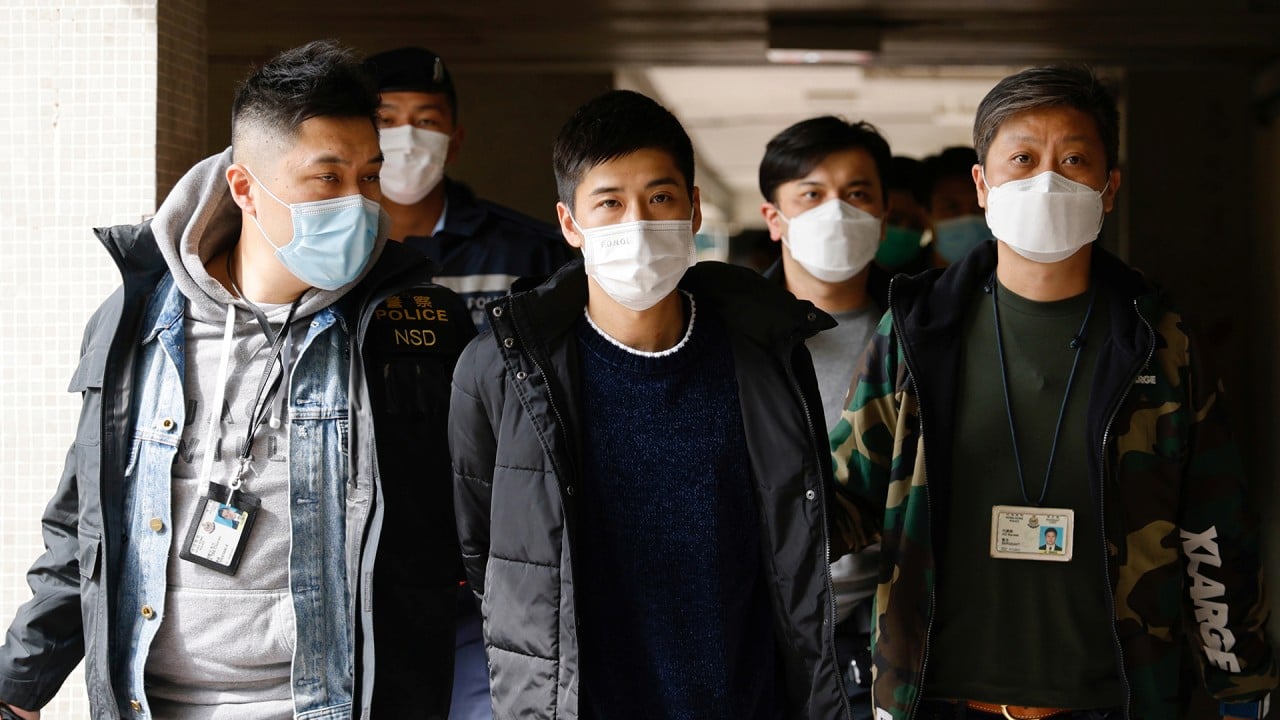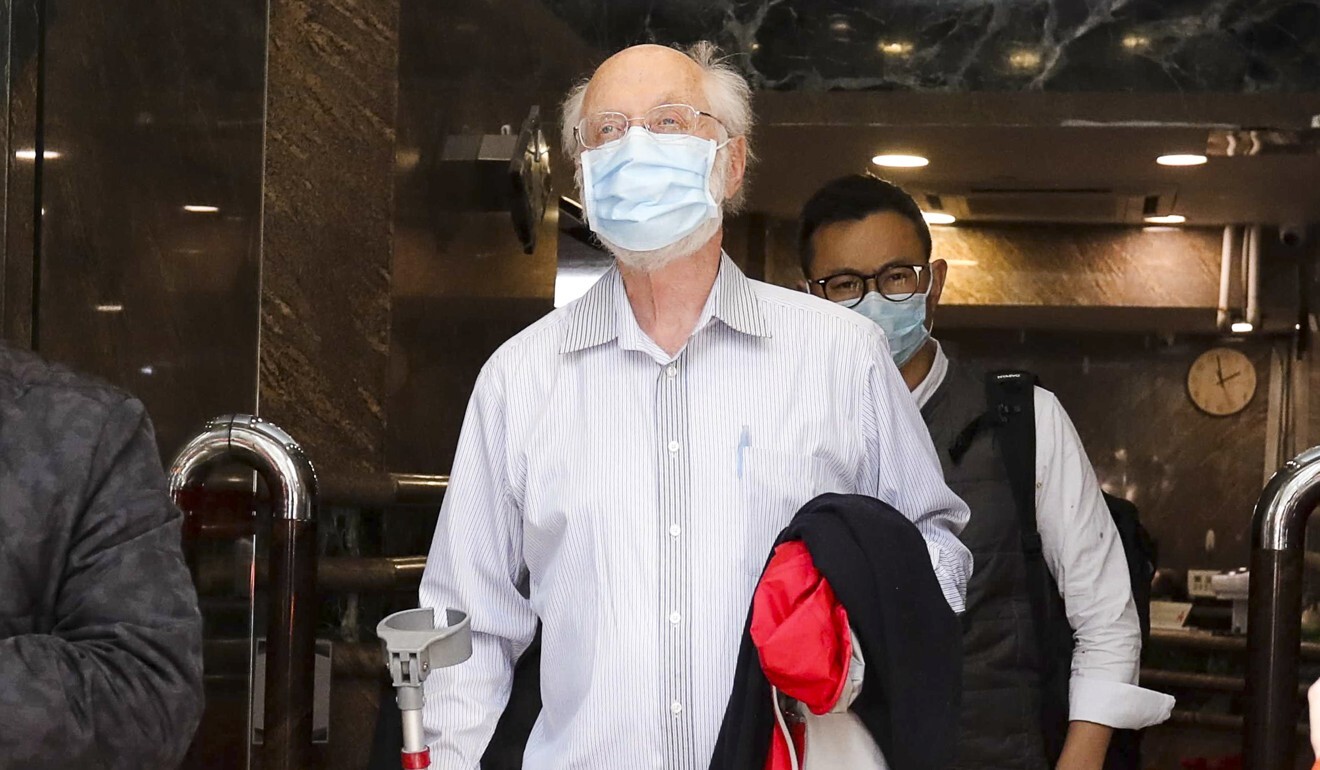
Hong Kong national security law: police begin to release ex-lawmakers and activists, including Benny Tai, arrested in crackdown a day earlier without charging them
- Authorities contend that the opposition camp’s campaigning for primary elections held last July included plans to ‘paralyse’ and ‘overthrow’ the government
- Tai, who masterminded the contest, says Hong Kong has entered a ‘cold winter’ as he leaves police station
Despite being held for questioning for more than 30 hours, many of the released remained defiant and slammed the crackdown as absurd.
Several said their participation in primary elections last year was the only link to the allegations of subversion and police had failed to produce any evidence of actions or comments that could be construed as breaking the Beijing-imposed law.

01:17
Benny Tai among Hong Kong opposition figures released by police after crackdown
“Hong Kong has entered a cold winter, the wind is strong and cold,” he said. “But I believe many Hongkongers will still use their own way to move forward against the wind. Thank you.”
Tai, who had drafted the “35-plus” strategy, was singled out by both the Office for Safeguarding National Security and Beijing’s liaison office in Hong Kong, which issued statements backing the crackdown on Wednesday.
The spokesman for the liaison office also said “members of the public [had been] misled to vote in the so-called primary”, but now “the general public can clearly see the evil intentions of Benny Tai Yiu-ting and others, and the harm caused to Hong Kong society”.
By 11.30pm, police had released more than 30 of the 53 suspects.
Leaving Western police station, district councillor Lester Shum said the accusations relied merely on the opposition taking part in the contest last July to determine the camp’s strongest candidates for the now-delayed legislative elections.

“I think it is absurd because they are not alleging I have said something or have done something after I participated in the [primary] elections,” said Shum, a former student leader. “They merely accused me of subversion because we have all participated in the democratic primaries.”
Former lawmaker Raymond Chan Chi-chuen accused the government of using the national security law to suppress opposition parties.
“How do our actions endanger the country? The right to participate in an election and to exercise the veto power as an elected legislator come from the Basic Law,” he said referring to the city’s mini-constitution as he left Central police station.
He was granted HK$30,000 (US$3,870) bail and required to surrender his passport.
Former lawmaker Helena Wong Pik-wan said: “Regardless if the police lay charges, we are banned from leaving Hong Kong in the coming six months and are stuck here. They detained us for 30 hours. I think they want to threaten Hong Kong people not to run in elections.”
Explainer: What led to biggest mass arrests under legislation?
Nearly 1,000 officers carried out the arrests in raids across the city shortly after dawn on Wednesday.
While Beijing welcomed the crackdown, Western nations condemned the move as an attack on human rights. US Secretary of State Mike Pompeo said the Trump administration was weighing sanctions on the authorities involved, as well as restrictions against the Hong Kong Economic and Trade Office in the United States.
Police confirmed they had arrested young activist Joshua Wong Chi-fung and Tam Tak-chi, who are already behind bars. A source said they were accused of the same offence of subversion in relation to the primary elections.
Tam, of the group People Power, was also questioned at the centre, where he has been held since being charged with conspiracy to utter seditious words last year. A post on Wong’s Facebook’s page confirmed the arrest, adding he was questioned without a lawyer present.
Mass arrest of opposition lawmakers, activists; authorities accuse them of plot to ‘overthrow’ government
The legal system allows for officers to arrest people already in detention, Man noted.
According to a source, police are expected to release all the suspects except for former Democratic Party leader Wu Chi-wai, who will remain in custody after he had failed to surrender his BN(O) passport as part of bail terms in another case. A court will decide on Friday whether that earlier bail should be revoked.
Former Civic Party lawmaker Kwok Ka-ki expressed gratitude for the support the public had shown him. “I have been released on bail and am grateful for everyone’s concern during this trying time,” he said in a Facebook post after leaving Central police station. “We must persevere, and in time, a new hope will emerge.”

03:04
Mass arrests of Hong Kong opposition lawmakers, activists under national security law
Others admitted they were uncertain about what might happen next but vowed they would not be cowed by the authorities. Carol Ng, the chairwoman of the Confederation of Trade Unions, said she spent a cold night in the Sau Mau Ping police station, wondering whether she might be detained at length.
“There was a moment I feared I might not be able to get out again,” Ng said, as she waved to waiting supporters. She pledged to carry on with her work as a union representative, adding: “Hong Kong people should stay united.”
Sham Shui Po district councillor Kalvin Ho Kai-ming was equally defiant as he emerged from the local police station. “Evil will never be able to defeat justice,” said the Association for Democracy and People’s Livelihood member. The mass arrests would not deter the public’s determination to fight for democracy, he said.
National security law: Hong Kong activist facing up to seven years in prison
Emerging into the brisk night air in Mong Kok following his release, Ventus Lau said investigators had shown him excerpts of his speeches posted to his Facebook page but they were in simplified Chinese characters used on mainland China.
“It’s so clear who the people are pushing this operation,” he said. “And the purpose is to catch all the pan-democrats in one go.”
It was understood that John Clancey, the first American detained under the new law, was the first to be released in the early morning. The lawyer was detained on suspicion of helping to organise the primary elections. Pompeo expressed alarm over the news, warning Washington would not tolerate “arbitrary detention or harassment” of its citizens.

Tai and Clancey, also a permanent Hong Kong resident, were arrested on suspicion of subverting state power by organising the primary, along with four others: Power for Democracy convenor Andrew Chiu Ka-yin; deputy convenor Ben Chung Kam-lun; former lawmaker and a key organiser of the polls Au Nok-hin; and Gordon Ng Ching-hang.
Authorities said the opposition camp’s “35-plus” plan to seize control of Legco was part of a broader strategy to paralyse the government, provoke Beijing into ending the “one country, two systems” policy under which Hong Kong was governed and trigger international sanctions against the nation.
Tam Yiu-chung, the city’s sole delegate to China’s top legislative body, the National People’s Congress Standing Committee, told a radio programme the goal of the primary was “obvious” and breached the national security law, even if no violence was involved.
“You should not merely focus on the primary election itself,” Tam said. “The whole plan [by Tai] involves uniting the pro-democracy camp to gain a majority of seats in the legislature, then paralyse the government by rejecting the annual budget, and have the chief executive step down.
“When the aim is to subvert state power, it is in violation of Article 22 of the national security law.”
Separately, Chung Kim-wah, the deputy head of the Public Opinion Research Institute, said he had visited police headquarters to assist with the investigation. The institute helped organise the primary polls, but Chung said he gave no information to officers.
Additional reporting by Chan Ho-him, Robbie Hu and Danny Mok




